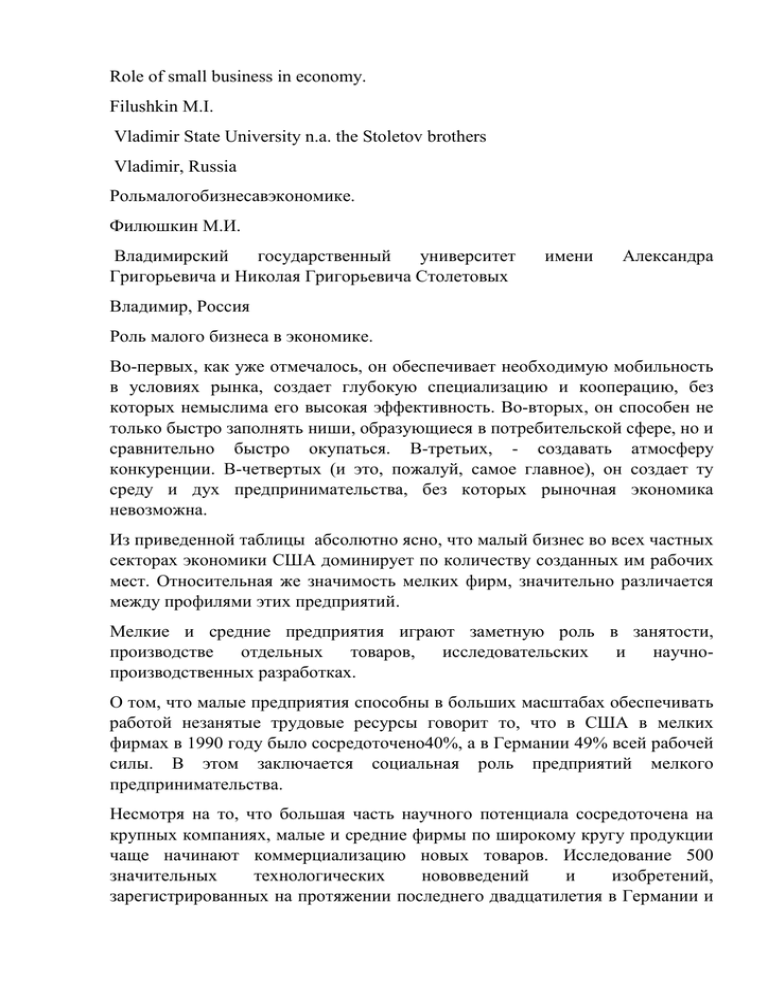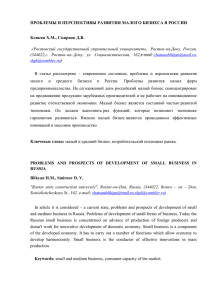Role of small business in economy. Filushkin M.I. Vladimir, Russia
реклама

Role of small business in economy. Filushkin M.I. Vladimir State University n.a. the Stoletov brothers Vladimir, Russia Рольмалогобизнесавэкономике. Филюшкин М.И. Владимирский государственный университет Григорьевича и Николая Григорьевича Столетовых имени Александра Владимир, Россия Роль малого бизнеса в экономике. Во-первых, как уже отмечалось, он обеспечивает необходимую мобильность в условиях рынка, создает глубокую специализацию и кооперацию, без которых немыслима его высокая эффективность. Во-вторых, он способен не только быстро заполнять ниши, образующиеся в потребительской сфере, но и сравнительно быстро окупаться. В-третьих, - создавать атмосферу конкуренции. В-четвертых (и это, пожалуй, самое главное), он создает ту среду и дух предпринимательства, без которых рыночная экономика невозможна. Из приведенной таблицы абсолютно ясно, что малый бизнес во всех частных секторах экономики США доминирует по количеству созданных им рабочих мест. Относительная же значимость мелких фирм, значительно различается между профилями этих предприятий. Мелкие и средние предприятия играют заметную роль в занятости, производстве отдельных товаров, исследовательских и научнопроизводственных разработках. О том, что малые предприятия способны в больших масштабах обеспечивать работой незанятые трудовые ресурсы говорит то, что в США в мелких фирмах в 1990 году было сосредоточено40%, а в Германии 49% всей рабочей силы. В этом заключается социальная роль предприятий мелкого предпринимательства. Несмотря на то, что большая часть научного потенциала сосредоточена на крупных компаниях, малые и средние фирмы по широкому кругу продукции чаще начинают коммерциализацию новых товаров. Исследование 500 значительных технологических нововведений и изобретений, зарегистрированных на протяжении последнего двадцатилетия в Германии и США, обнаружило важную роль небольших фирм даже в воплощении в жизнь существенных технологических нововведений. Доля технологических нововведений в США и Германии в 80-х годах в % США Германия Мелкие фирмы 35% 26% Средние фирмы 15% 11% Крупные фирмы 50% 63% Успех малого бизнеса в этой области можно объяснить следующими причинами. Углубление специализации в научных разработках привело к тому, что во многих случаях небольшие фирмы идут по более простому или рискованному пути, работают в неперспективных отраслях. Мелкие фирмы также охотно берутся за освоение оригинальных нововведений, поскольку при выпуске принципиально нового изделия снижается значение крупных лабораторий с устоявшимися направлениями исследований. К тому же малые фирмы стремятся как можно скорее наладить массовое производство. Тем самым, значение разработок, проводимых мелкими предприятиями достаточно важно, прежде всего с точки зрения расширения рынка предлагаемых товаров и услуг, что в свою очередь активно стимулирует процесс производства с целью наиболее быстрого удовлетворения (вновь рожденного) спроса, мотивируемого разработками, проводимыми фирмами малого и среднего предпринимательства. Отношение нововведений к затратам на научные исследования и разработки малых предприятий в 3-4 раза выше, чем в крупных. Если проследить путь изобретения, использованного крупными монополиями, то нередко оно оказывается результатом работы отдельных ученых или мелких фирм. Однако последующее внедрение осуществляется компаниями, обладающими необходимыми для этого финансовыми и материальными ресурсами. Обобщая все вышесказанное, хотелось бы обратить внимание на то, что мелкое предпринимательство воздействует на структуру рынка и расширение рыночных отношений прежде всего в результате изменения количества субъектов рынка, повышения квалификации и степени приобщенности все более и более широких слоев населения к системе предпринимательства и делового администрирования. Развитие специализации и кооперации вовлекает мелких и средних предпринимателей в сферу влияния крупных объединений. Фактически они теряют свою независимость и превращаются в отдельные звенья более крупных монополий, хотя официальная статистика учитывает их как самостоятельные единицы. Крупные предприятия привлекают узкоспециализированные мелкие фирмы, производящие для них отдельные детали и узлы. Вокруг монополий, особенно в отраслях машиностроения, электронной промышленности, группируются обычно по несколько десятков тысяч мелких предприятий, которые пользуются финансовой и технической помощью монополий. Для хозяев монополистических объединений также мелкие субподрядчики удобны и выгодны: они поставляют свою продукцию по достаточно низким ценам. Их производственные, социальные и другие проблемы мало заботят руководителей монополий. В периоды неблагоприятной конъюнктуры и других осложнений, монополии (хозяева) рвут связи со своими мелкими поставщиками, бросая их на произвол судьбы. В последнее десятилетие во многих странах усилилась тенденция к объединению мелких предприятий на основе специализации и кооперации производства, в крупные отраслевые структуры, которые сейчас производят большие объемы разнообразной продукции, в том числе высокого технического и технологического уровня, и довольно успешно конкурируют на рынках с крупными компаниями и монополиями. Важность малых предприятий еще и в том, что ведя ожесточенную конкурентную борьбу за выживание, они вынуждены постоянно развиваться и адаптироваться к текущим условиям рынка, ведь чтобы существовать надо получать средства к существованию, а значит быть лучше других, чтобы прибыль доставалась именно им. Массовый выпуск промышленных изделий длительного потребления (автомобилей, холодильников, телевизоров и т. п.) крупными предприятиями вызывает потребность в соответствующих промышленных услугах по ремонту и обслуживанию, которые часто осуществляют мелкие предприятия, так как монополии из-за своей громоздкости вынуждены затрачивать много усилий в этом направлении или создавать разветвленную сеть маленьких филиалов, что само по себе тоже достаточно дорогостоящее занятие, служащее в основном для поддержания престижа крупной фирмы. Деятельность малых предприятий в менее развитых районах западноевропейских стран - это основа всей их социальной и экономической жизни и решающая предпосылка их дальнейшего хозяйственного развития. В то же время, на мелких предприятиях отмечается более высокая эффективность труда, малые фирмы с меньшими затратами удовлетворяют потребности в дефицитных видах товаров и услуг на основе разработки местных источников (сырья) и обеспечивает при этом большую занятость. Они увеличивают размеры поступлений в муниципальные бюджеты, стимулируют НТП, выполняют другие важные для хозяйства функции. На современном этапе повышение роли предприятий малого бизнеса в экономике Германии, США и других развитых странах - не случайность, а необходимая закономерность, вызванная самим ходом истории, и потребностями, которые возникали в процессе развития производительных сил и технологий. Role of small business in economy. First, as it was already noted, he provides necessary mobility in the conditions of the market, creates deep specialization and cooperation without which its high efficiency is inconceivable. Secondly, it is capable not only to fill quickly the niches which are formed in the consumer sphere but also rather quickly to pay off. Thirdly, - to create the atmosphere of the competition. Fourthly (and it, perhaps, the most important), he creates that Wednesday and spirit of business without which the market economy is impossible. From the provided table absolutely clearly that small business in all private sectors of economy of the USA dominates by quantity of the workplaces created by it. The relative importance of small firms, considerably differs between profiles of these enterprises. Small and medium-sized enterprises play a noticeable role in employment, production of separate goods, research and research and production development. Says about that small enterprises are capable to provide employment to an unoccupied manpower in big scales that in the USA in small firms in 1990 was sosredotocheno40%, and in Germany 49% of all labor. The social role of the enterprises of small business consists in it. In spite of the fact that the most part of scientific potential is concentrated on the large companies, small and medium-sized companies on a wide range of production begin commercialization of new goods more often. Research of 500 considerable technological innovations and inventions registered for the last twentieth anniversary in Germany and the USA found an important role of small firms even in an embodiment in life of essential technological innovations. Share of technological innovations in the USA and Germany in the eighties in % USA Germany Smallfirms 35% 26% Averagesof firm 15% 11% Largeof firm 50% 63% The success of small business in this area can be explained with the following reasons. Deepening of specialization in scientific development led to that in many cases small firms go on simpler or risky way, work in unpromising branches. Small firms also willingly undertake development of original innovations as when releasing essentially new product value of large laboratories with the settled directions of researches decreases. Besides small firms seek to arrange mass production as soon as possible. Thereby, value of the development which is carried out by the small enterprises rather important, first of all from the point of view of expansion of the market of the offered goods and services that in turn actively stimulates process of production for the purpose of the fastest satisfaction (again given rise) demand motivated by the development which is carried out by firms of small and average business. The relation of innovations to costs of scientific researches and development of small enterprises is 3-4 times higher, than in the large. If to track a way of the invention worked by large monopolies, quite often it appears result of work of certain scientists or small firms. However the subsequent introduction is carried out by the companies possessing financial and material resources necessary for this purpose. Generalizing all aforesaid, it would be desirable to pay attention that small business influences structure of the market and expansion of the market relations first of all as a result of change of number of subjects of the market, professional development and degree of a priobshchennost more and more a general population to system of business and business administration. Development of specialization and cooperation involves small and average businessmen in a sphere of influence of large associations. Actually they lose the independence and turn into separate links of larger monopolies though the official statistics considers them as independent units. The large enterprises attract the highly specialized small firms making for them separate details and knots. Round monopolies, especially in branches of mechanical engineering, electronic industry, are grouped usually on some tens of thousands of the small enterprises which use financial and technical assistance of monopolies. Also small subcontractors are convenient and favorable to owners of monopolistic associations: they deliver the production at rather low prices. Their production, social and other problems worry heads of monopolies a little. During the periods of adverse conditions and other complications, monopolies (owners) tear communications with the small suppliers, leaving them to the mercy of fate. In the last decade in many countries the tendency to merger of the small enterprises on the basis of specialization and cooperation of production amplified, in large branch structures which now make large volumes of various production, including high technological and technological level, and quite successfully compete in the markets with the large companies and monopolies. Importance of small enterprises also that conducting fierce competitive fight for a survival, they are compelled to develop and adapt constantly for the current conditions of the market, after all to exist it is necessary to receive means of livelihood, so to be better than others that they got profit. number of subjects of the market, professional development and degree of a priobshchennost more and more a general population to system of business and business administration. Mass release of industrial products of long consumption (cars, refrigerators, TVs, etc.) by the large enterprises causes need for the corresponding industrial services in repair and service which often carry out the small enterprises as monopolies because of the bulkiness are compelled to spend many efforts in this direction or to create an extensive network of small branches that rather expensive occupation in itself too serving in the basic for maintenance of prestige of major company. Activity of small enterprises in less developed regions of the West European countries is a basis of all of their social and economic life and the decisive prerequisite of their further economic development. At the same time, at the small enterprises higher efficiency of work is noted, small firms with smaller expenses satisfy needs for scarce types of goods and services on the basis of development of local sources (raw materials) and provides thus big employment. They increase the amount of receipts in municipal budgets, stimulate NTP, carry out other functions, important for economy. At the present stage increase of a role of small business enterprises in economy of Germany, the USA and other developed countries - not accident, but the necessary regularity caused by the course of history, and requirements which arose in development of productive forces and technologies.

